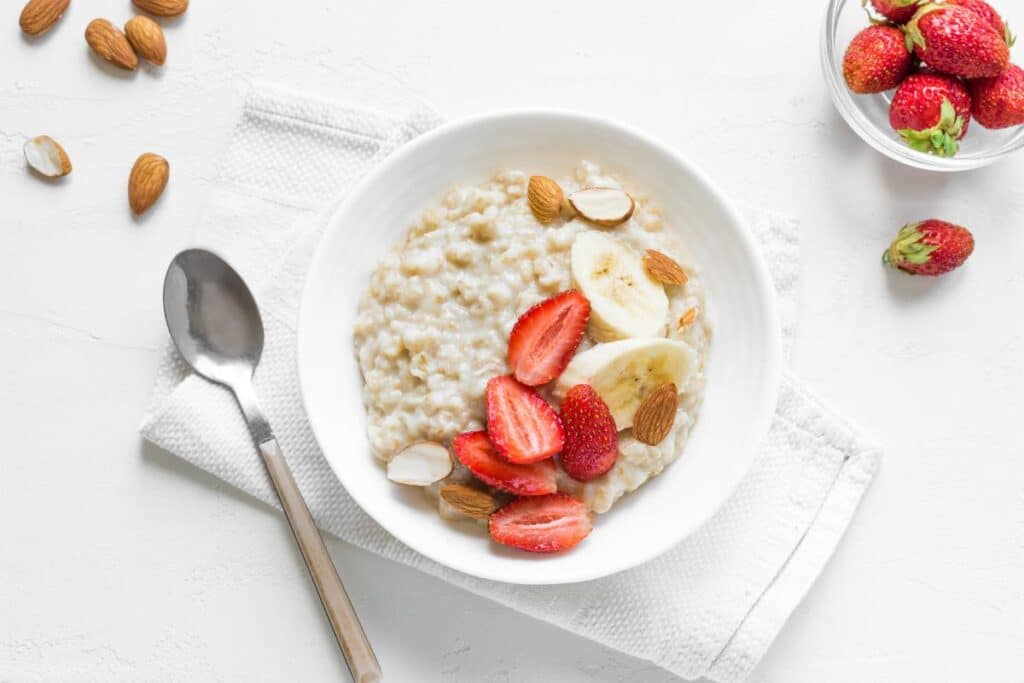Do you want to know more about the health benefits of eating oatmeal? One thing that may surprise you is that oatmeal is not a breakfast food. In fitness and nutrition, timing can be crucial in optimizing your efforts and achieving your desired goals.
Oatmeal, a versatile and nutritious whole grain, has long been touted as a breakfast staple for its numerous health benefits. However, recent insights into its nutritional profile suggest that consuming it in the afternoon might be a strategic move for enhancing its fitness journey.
By harnessing its unique properties and aligning them with the body’s natural rhythms, consuming oatmeal in the afternoon can potentially accelerate your path to fitness success.
Understanding the Nutritional Profile of Oatmeal
Before delving into the reasons behind the afternoon consumption of oatmeal, it’s essential to comprehend the nutritional richness that makes it a popular choice among health-conscious individuals. It is an excellent source of complex carbohydrates, dietary fiber, vitamins, and minerals. Notably, it contains a soluble fiber known as beta-glucan, which has been shown to impact cholesterol levels and heart health positively.
Furthermore, oatmeal provides a steady release of energy due to its low glycemic index (GI) value. This ensures that blood sugar levels remain stable, preventing energy crashes and promoting sustained energy levels throughout the day.
Synchronizing Nutrition with the Body’s Rhythms
Our body’s circadian rhythm, the internal clock, governs various physiological processes, including metabolism and digestion. Research has suggested that our metabolism tends to be more efficient during the afternoon and early evening hours, making this period an opportune time to consume particular nutrients.
Eating oatmeal in the afternoon allows you to leverage your body’s natural rhythms to maximize nutrient absorption and utilization. The complex carbohydrates in oatmeal provide a source of sustained energy, which can be particularly beneficial if you plan to work out later in the day.
Enhancing Fitness Goals Through Afternoon Oatmeal Consumption
- Energy for Workouts: Oatmeal’s carbohydrate content serves as an energy reservoir, fueling your muscles for the physical demands of exercise. Consuming oatmeal in the afternoon gives your body the energy to power through your workout effectively.
- Muscle Recovery: Oatmeal’s carbohydrate and protein blend can aid post-workout recovery. Carbohydrates replenish glycogen stores in muscles, while the amino acids from protein support muscle repair and growth. Oatmeal in the afternoon can facilitate recovery after a morning or midday workout.
- Appetite Regulation: The dietary fiber in oatmeal contributes to feelings of fullness and satiety. Consuming it in the afternoon can help curb excessive hunger and potentially prevent overeating later in the day, aligning with weight management goals.
- Nutrient Timing: Timing your nutrient intake can influence how effectively your body utilizes nutrients. Oatmeal in the afternoon allows your body to capitalize on its natural metabolic rhythm, enhancing nutrient absorption and utilization.
- Blood Sugar Regulation: The soluble fiber in oatmeal helps stabilize blood sugar levels, preventing drastic spikes and crashes. By consuming it in the afternoon, you can maintain steady energy levels and avoid the mid-morning slump often associated with high-sugar breakfast options.
Hormones
Oatmeal’s impact extends beyond its physical nourishment; it also supports mental and sleep health through its influence on serotonin and melatonin. Serotonin, a neurotransmitter associated with mood regulation and well-being, is influenced by the amino acid tryptophan found in oatmeal.
Oatmeal contributes to the production of serotonin by providing a source of tryptophan, promoting a positive mood and overall emotional balance. Additionally, oatmeal’s complex carbohydrates trigger a gradual release of insulin, facilitating the entry of tryptophan into the brain, where it’s converted into serotonin. Furthermore, oatmeal contains essential nutrients like vitamin B6 for converting tryptophan into serotonin.
Beyond its impact on serotonin, oatmeal’s contribution to sleep health is notable due to its role in melatonin production. Melatonin, the hormone responsible for regulating sleep-wake cycles, is influenced by the carbohydrates and nutrients in oatmeal.
The gradual release of energy from oatmeal helps stabilize blood sugar levels, indirectly supporting the body’s natural melatonin release in the evening and improving sleep quality. Thus, oatmeal’s interaction with serotonin and melatonin underscores its multifaceted benefits for mental well-being and restful sleep.
Conclusion
While oatmeal has traditionally been a breakfast staple, emerging research suggests that strategically incorporating it into your afternoon routine can yield remarkable fitness benefits. Its nutritional profile, combined with the body’s circadian rhythms, makes oatmeal a valuable ally for anyone pursuing fitness goals.
Consuming oatmeal in the afternoon provides your body with a sustained energy source, aiding in post-workout recovery, regulating appetite, and promoting stable blood sugar levels. As you navigate your fitness journey, consider adjusting your nutritional timing to harness the power of oatmeal and align it with your body’s innate rhythms, helping you achieve your fitness goals faster and more efficiently. Remember, the key lies in what you eat and when you eat it.
If you are on a weight loss journey, share this article on Facebook or Twitter to help others learn more about losing weight.




